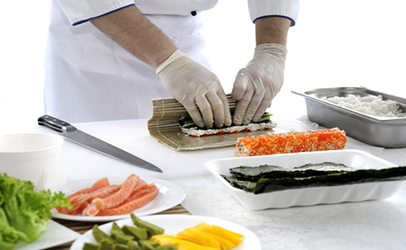The recent temporary closures of Sushi Dojo in New York’s East Village and its offshoot Sushi Dojo Express in Gansevoort Market have raised questions about whether the city’s health department is ruining the business with inappropriate regulations. According to the New York City Department of Health (DOH), the popular sushi restaurants were closed as a public health risk “for a combination of bare hand contact and food out of temperature.” Sushi Dojo was closed after seven inspections since it opened. It was cited six times for bare hand  contact, which the sushi restaurant admitted in subsequent hearings. Sushi Dojo and its offshoot Sushi Dojo Express were informed in writing that they must comply with the Big Apple’s health code or they could face revocation of their permits if they continue using bare hand contact to make and serve sushi. But the closures came because of a “BS rule,” according to chef David Bouhadana, whose third restaurant is Dojo Izakaya. He told Grub Street: “Sushi is being ruined [by] gloves, freezing fish and more issues.” He claims that DOH does not understand the culture of high-end sushi, where sushi chefs are taught to be clean, hygienic and professional. Bouhadana acknowledges that sushi chefs are wearing gloves only when inspectors arrive. “When a health inspector walks in, we all have our code word, we all have our drill: Put the gloves on, smile to the inspector, they walk in, they walk out. You’re good for six months,” he says. His inspections apparently escalated when he was told to throw food away. Bouhadana said when he was vocal about it, the inspections became more difficult and his grade was lowered to a “C.” “How am I supposed to run a legit business charging $100 a person with a C grade?” he asks. Inspectors have now targeted and profiled him, he says. “And they want David to wear gloves or they are going to close his restaurant,” he adds, saying that he’s paid $6,000 in fines in past few months. Bouhadana’s written warnings came in letters on Sept. 23 and Oct. 7, 2015. The violations were observed in a re-inspection on Oct. 21, and the restaurant was closed for an existing uncorrected public health hazard. New York City is not the only jurisdiction that has found it difficult to enforce the so-called “no bare hands” rule. California adopted it and then repealed it, also when high-end sushi bars objected. California sushi chefs argued that their craft was an art requiring that they feel the rice and that, to protect from cross-contamination with different species of fish, they must constantly wash their hands.
contact, which the sushi restaurant admitted in subsequent hearings. Sushi Dojo and its offshoot Sushi Dojo Express were informed in writing that they must comply with the Big Apple’s health code or they could face revocation of their permits if they continue using bare hand contact to make and serve sushi. But the closures came because of a “BS rule,” according to chef David Bouhadana, whose third restaurant is Dojo Izakaya. He told Grub Street: “Sushi is being ruined [by] gloves, freezing fish and more issues.” He claims that DOH does not understand the culture of high-end sushi, where sushi chefs are taught to be clean, hygienic and professional. Bouhadana acknowledges that sushi chefs are wearing gloves only when inspectors arrive. “When a health inspector walks in, we all have our code word, we all have our drill: Put the gloves on, smile to the inspector, they walk in, they walk out. You’re good for six months,” he says. His inspections apparently escalated when he was told to throw food away. Bouhadana said when he was vocal about it, the inspections became more difficult and his grade was lowered to a “C.” “How am I supposed to run a legit business charging $100 a person with a C grade?” he asks. Inspectors have now targeted and profiled him, he says. “And they want David to wear gloves or they are going to close his restaurant,” he adds, saying that he’s paid $6,000 in fines in past few months. Bouhadana’s written warnings came in letters on Sept. 23 and Oct. 7, 2015. The violations were observed in a re-inspection on Oct. 21, and the restaurant was closed for an existing uncorrected public health hazard. New York City is not the only jurisdiction that has found it difficult to enforce the so-called “no bare hands” rule. California adopted it and then repealed it, also when high-end sushi bars objected. California sushi chefs argued that their craft was an art requiring that they feel the rice and that, to protect from cross-contamination with different species of fish, they must constantly wash their hands.
(To sign up for a free subscription to Food Safety News, click here.)
